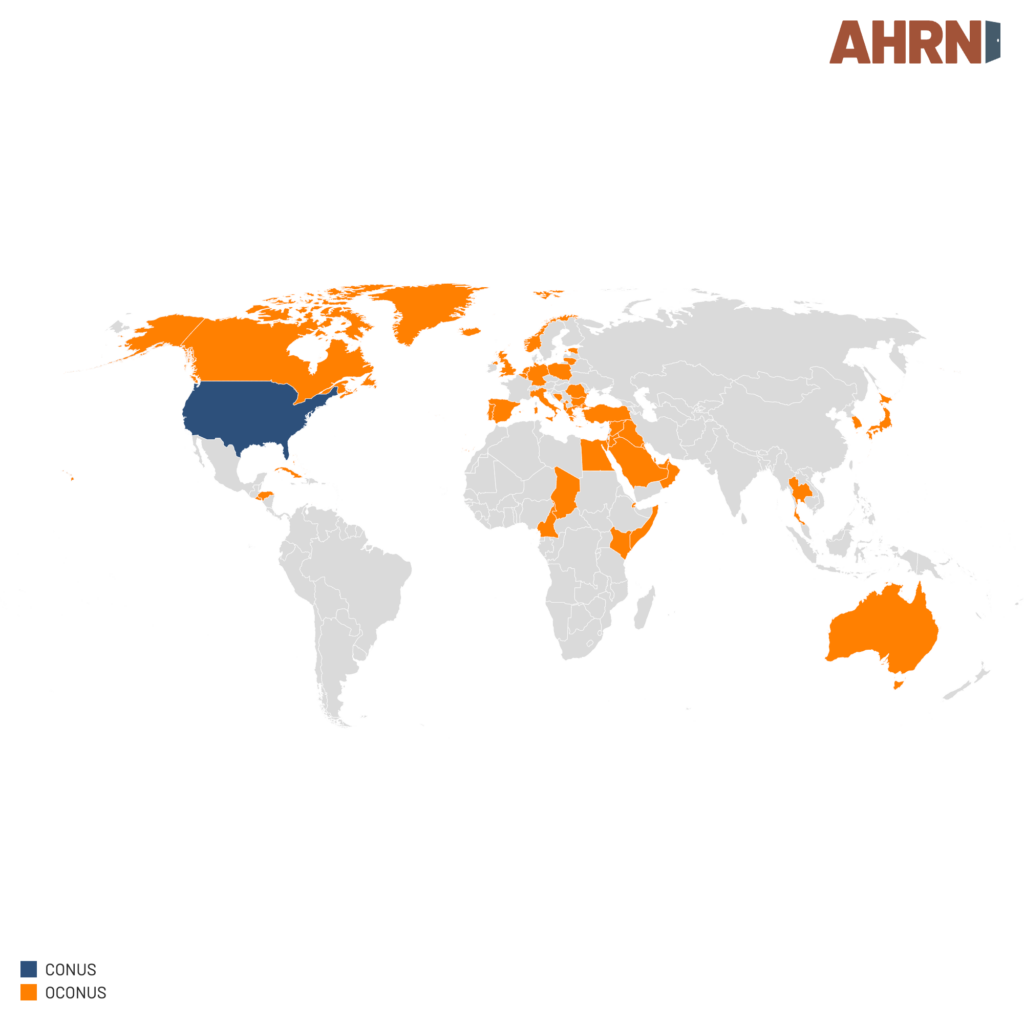As you get ready for a military move, also known as a Permanent Change of Station or PCS, you’re likely to encounter a lot of regulations and checklists , not to mention a host of new acronyms. Two of the first you’ll see are CONUS and OCONUS, referring to the location of your new home.
CONUS duty stations are located in the continental U.S. This includes all 48 states, plus the District of Columbia. The exact method of moving can vary based on how far you have to travel and your household requirements. However, generally speaking, CONUS moves take less time and require fewer official approvals once you have a new set of military orders in hand.
Duty stations outside the continental U.S. , or OCONUS , can require extra steps when relocating. OCONUS moves include those to Hawaii, Alaska, U.S. territories, and other countries. Special considerations vary by location and include command sponsorship, pet approval, potential quarantine, and a much more complicated household goods process.

1. Lodging
No matter where you move, chances are you’ll spend some time in temporary lodging, either a hotel or a short-term rental. These expenses fall outside the typical expected expenses, so the military covers them by authorizing Temporary Lodging Expense (TLE) or Temporary Lodging Allowance (TLA) .
TLE is provided for up to 14 days during CONUS moves. It can be extended in some circumstances, such as if you move to an area with a recognized housing shortage, but in most cases, it tops out at 14 days. You can use TLE to offset the cost of lodging and meals which is based on your duty station’s official per diem rate. You must provide receipts to get this allowance.
TLA works similarly but is available for up to 60 days and authorized when moving OCONUS. When you leave your OCONUS duty station, you can get up to 10 days of TLA. Like TLE, the official per diem rate at your OCONUS duty station determines the TLA amount. To receive this allowance, you’ll submit paperwork, including lodging receipts and evidence that you are actively looking for or awaiting housing, through your command every 15 days.
2. Transporting Privately Owned Vehicles (POVs)
Relocating to your new duty station with your car is likely necessary for you to get to and from work, not to mention take advantage of everything your new home has to offer. But how do you transport your privately owned vehicle (POV) when preparing for a military move?
With CONUS move, you have more options to get your vehicle to your new city. You can ship your car from one place to another using a third-party shipping company. You can also drive your vehicle or tow it behind a moving truck. For CONUS moves, the government does not pay for or authorize specific vehicle relocations, but they will pay Monetary Allowance in Lieu of Transportation (MALT) for up to two privately owned conveyances (POC), another acronym for a personal vehicle. MALT is based on a per-mile rate and calculated using the distance between the two duty stations.
Moving your vehicle to your new OCONUS duty station requires extra prep work but less money out of pocket. The government authorizes shipment from the continental U.S. to your new OCONUS duty station for just one vehicle. The downside is you must drop off your one vehicle at an authorized shipping point in pristine condition, and you’ll need to pick it up at a specific arrival point near your new home.
3. Weight
Military moves are based on the weight of your household goods (HHG) , not the number of rooms or the size of your home. The exact weight authorized depends on your rank at the time your official orders are written and the number of dependents claimed in your military record. Higher ranking military members, as well as those with more dependents, are authorized to move more HHG, although the maximum weight allowed tops off at 18,000 pounds.
When conducting an HHG move, you can ship them using a military-approved carrier paid directly through the Transportation Office or arrange the move yourself and submit reimbursement. For OCONUS moves, it’s best to work directly with your new command or installation since there can be additional requirements and paperwork.
You can temporarily store your HHG, which may be necessary if you are awaiting housing or completing a renovation before moving in. For CONUS moves, the cost of temporary storage is allowed for up to 60 days, while OCONUS moves allow up to 90 days. You can extend these deadlines in some cases with an official written request.
4. Cost of Living Allowances
The actual cost of living, which refers to the difference in typical daily expenses like food and gas, can vary widely even among cities in the U.S. Housing is not considered a cost of living since it falls under its own allowance category. When considering OCONUS duty stations with a different local currency, how far your military paycheck goes can be impacted. However, the government considers this too and authorizes a cost of living allowance (COLA) to offset these differences.
CONUS COLA is only authorized in areas 107% of the national average. The government uses the duty station zip code as well as your rank, years of service, and number of dependents to calculate COLA. Data is analyzed annually to see if COLA rates need adjustment.
OCONUS COLA is provided more often and accounts for the exchange rate if needed. The exact rate is based on your location, rank, time in service, and number of dependents.
One important distinction is that COLA received at a CONUS duty station is taxable, just like income. However, COLA provided at an OCONUS duty station is not taxed.
5. Housing
Housing is one of the biggest expenses a military member has to account for when moving. The cost to buy or rent a home varies by location, which is why your duty station’s zip code is the primary metric used to determine housing allowance.
At a CONUS duty station, you receive Basic Housing Allowance (BAH) , determined using your duty station’s zip code as well as your rank and number of dependents. The average cost of rentals determines non-taxed BAH rates, but you can use this allowance to cover rent or mortgage payments. Those living in military-provided housing will not receive BAH. In some cases, you can get partial BAH or BAH-Diff to cover child support.
For OCONUS moves, housing expenses are included in an Overseas Housing Allowance (OHA) . It works similarly to BAH but is based on the cost of renting a home, paying utilities, and moving in. A move-in housing allowance (MIHA) covers move-in expenses; it also provides a lump sum to pay for things required for a person to rent in the local economy at their OCONUS duty station, such as a security deposit.
Final Thoughts
Getting ready for a military move can be both exciting and overwhelming. Taking on the challenges of a new job along with establishing a new home can be made easier by knowing what entitlements and allowances to expect during the move.
From lodging during the move to transporting your vehicle, the differences between a CONUS and OCONUS move can be quite significant. While the weight of your allowed household goods moved is standard, the method of shipment varies. Cost of living allowances and housing expenses are primarily based on your CONUS or OCONUS location and help ensure you can afford to live comfortably in your new city.

